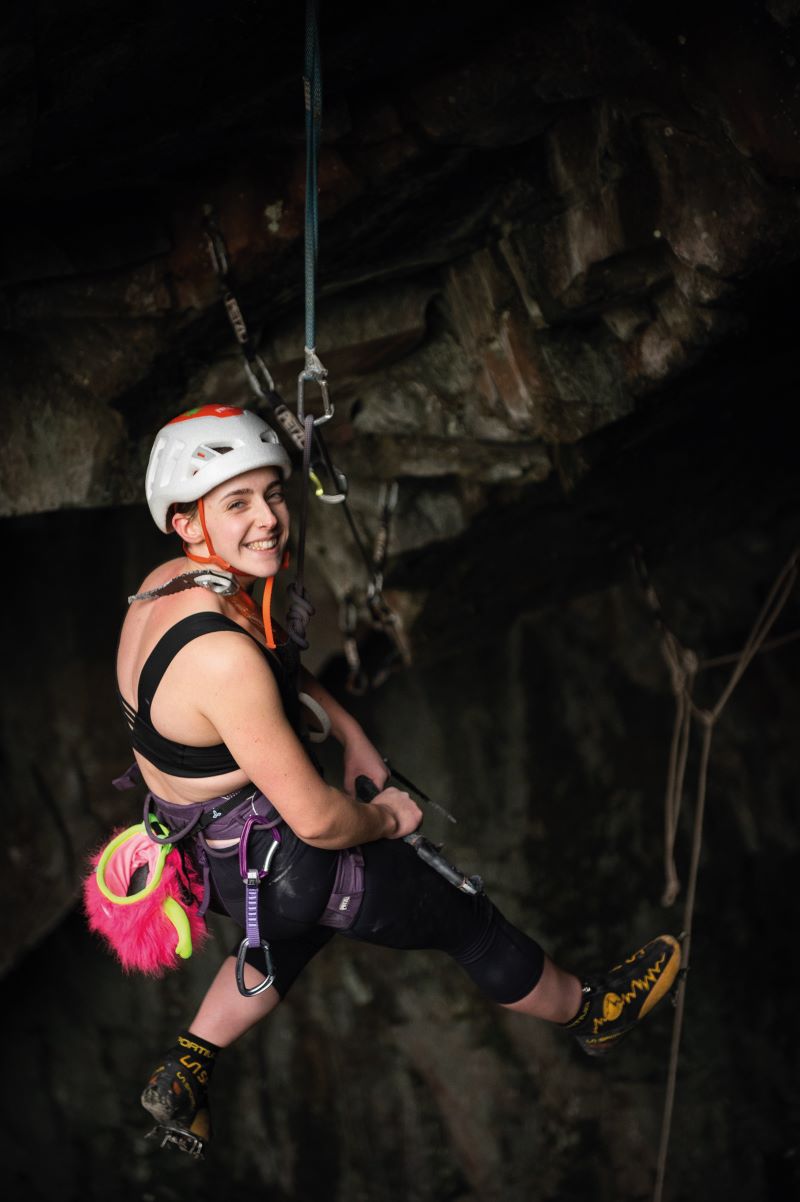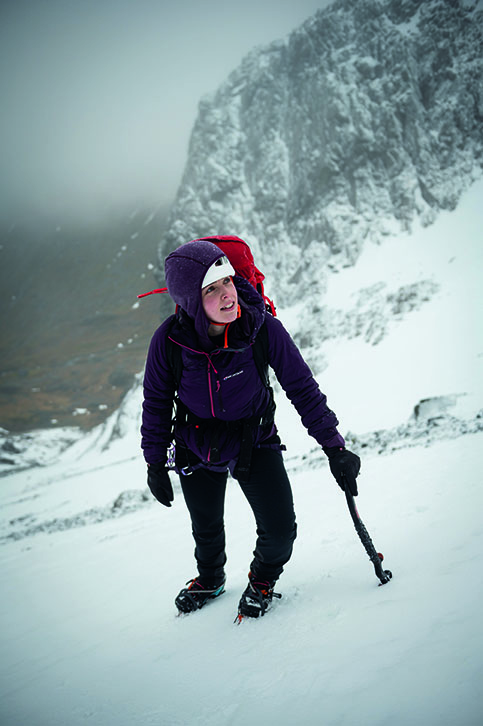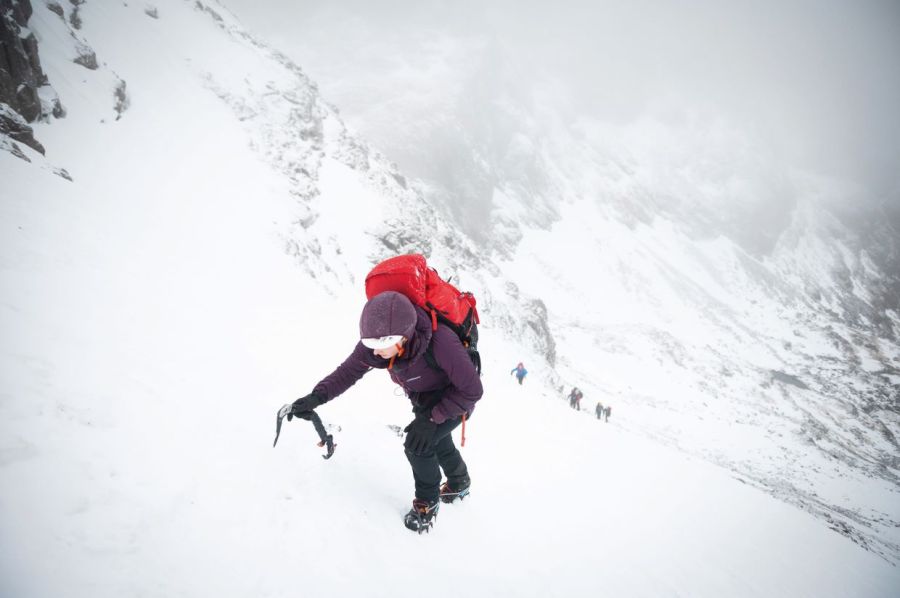Yorkshire-based ice climber and dry tooling athlete Emma Powell is the only Brit ever to podium twice at any UIAA Ice Climbing World Championships. She recently set a record by becoming the first British woman to complete a D12-graded climb in the UK. Here, she shares her training secrets…
Tell us about your ice climbing journey.
‘My grandpa and dad were climbers, so I think climbing is in my genes. By the age of five or six, I was following my dad out to do a bit of scrambling. At seven, I’d moved onto rock climbing. I’ve always been hyperactive, to the point where I was going to be medicated as a youngster. Despite trying every sport out there, climbing was the only thing that really helped me to calm down and completely switch off.
‘Discovering I could use axes for climbing was the best thing ever. I stand just under 5’2”, so I found some of the reaches on competition climbs hard. With ice climbing, however, there’s a hand hold or a foot hold wherever you are, and with dry-tooling (where you use crampons and ice axes on rock) I can sort of flick my legs over my arms and make my route that way. I do every type of climbing, including ice climbing and Scottish winter climbing, but I’m specifically pushing dry tooling right now because it’s such a precision sport.’

What does your typical training week look like?
‘I work full time in genetic toxicology, so all my training and climbing happens in the evenings or at the weekends. On Tuesdays and Thursdays, I do specific dry tooling training for two hours at my local climbing wall. On Mondays, Wednesdays and Fridays I’ll do gym work for an hour or two. And I usually do a six- to seven-hour outdoor climb at the weekend, along with some mountain biking or running.
‘My training goals mainly depend on what kind of event I’m training for. In a world competition or championship, you only climb for six minutes on a technical route, so it’s more about my technical ability and speed, and having enough power endurance to work slightly beyond my lactate threshold.
‘I work full time in genetic toxicology, so all my training and climbing happens in the evenings or at the weekends.’
‘When I’m working routes outside, I need a lot of explosive power and strength because there are many moments where I might need to lock off and pull my arms right down to my hips to get from one point to the next. I also spend time studying the holds and the movements I’ll need to make, so that my dad, a qualified strength and conditioning coach, can create training plans for me that are specific to the route I’m working on.
‘For example, if I’m going to be hanging upside down from my axes, he’ll give me things like barbell rows, deadlifts, cleans and squats to do, and we’ll even put in some heavy sessions where I’ll work up to my one rep max [1RM, or the most you can lift for one repetition] to mix things up. Or he might prescribe me more core stability work if I need to bring my legs up high.
‘Because climbing requires every type of fitness, I also do a lot of cross-training, kettlebell work and HIIT, which I love. Good cardio fitness definitely helps with climbing, so I did a lot of 10K runs, HIIT, rowing and work on a SkiErg to increase my VO2 max in the lead up to doing the Guardians of the Underworld D12 route. It really helped me when in upside-down positions, for which my feet were up, because trying to recover in that position before going for the next big move requires a lot of breathwork, especially when you feel like your arms are falling off. You can never be fit enough when it comes to climbing!’
How do your support your recovery?
‘I’d train every day if I could because I’m always one hundred per cent all of the time, so I often have to be told by my parents to chill out and take a rest day. That’s a good thing, otherwise I’d probably have picked up an injury by now. On rest days, I’ll stretch and do some foam rolling, along with some mobility and active recovery work to flush out the lactic acid. A hot bath also helps!’
What about your nutrition?
‘There’s nothing fancy about my diet. I just make sure I keep things balanced by eating my greens and lots of protein. As long as I’m eating enough, that’s good enough for me. Before setting off for a big day of climbing, I’ll have two breakfasts, including a big bowl of porridge, and I’ll keep my energy levels topped up with sandwiches, energy bars, energy gels and electrolytes in my water. Oh, and Jaffa Cakes. They might not be very healthy but they’re the best pick-me-up on a long day.’
 What’s in your essential kit bag?
What’s in your essential kit bag?
‘For training, I especially like my Montane Katla 4” shorts (£50). They’re a really simple, lightweight short with a phone pocket in the back. When I’m outside, I love my Montane Ineo Mission Pants (£100) because they’re pretty much indestructible, and the Montane Ground Control Jacket (£190) because it gives me that extra boost of heat when I stop climbing. My lucky charm is my fluffy, brightly-coloured chalk bag that I’ve named Ethel. Climbing quarries can be a little miserable and scary at times, but Ethel cheers me up.’
What’s your greatest achievement to date?
‘My greatest achievement is the fact that I still absolutely adore climbing. The main reason I got into climbing is because I found it fun, enjoyable and almost meditative, so I’m very proud of the fact that I still feel exactly the same way about it. It’s such a great achievement for me to be able to do these routes that, once upon a time, I used to watch all these big men do and think, “I can’t do that”. Now, I’m the only British woman to climb a D12-graded route in the UK, and I’m only one grade short of a D13, which is the hardest grade in the UK.’
Emma Powell is an ambassador for Montane. Find out more at montane.com
Words: Joanna Ebsworth | Images: Montane







